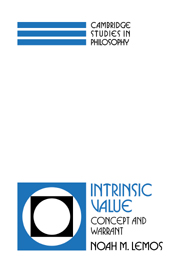Book contents
- Frontmatter
- Contents
- Preface
- Acknowledgments
- Part I Value, plurality, parts, and wholes
- Part II Naturalism, nonnaturalism, and warrant
- 7 The distinctiveness of intrinsic value
- 8 Intrinsic value and modest a priori justification
- 9 Coherence and experience
- Appendix A Chisholm's definition of organic unity
- Appendix B Some naturalistic analyses
- Selected bibliography
- Index
7 - The distinctiveness of intrinsic value
Published online by Cambridge University Press: 07 May 2010
- Frontmatter
- Contents
- Preface
- Acknowledgments
- Part I Value, plurality, parts, and wholes
- Part II Naturalism, nonnaturalism, and warrant
- 7 The distinctiveness of intrinsic value
- 8 Intrinsic value and modest a priori justification
- 9 Coherence and experience
- Appendix A Chisholm's definition of organic unity
- Appendix B Some naturalistic analyses
- Selected bibliography
- Index
Summary
If there is mathematical knowledge, then there is knowledge of mathematical facts and there are mathematical states of affairs that obtain. Similarly, if there is psychological knowledge, some psychological facts are known and there are psychological states of affairs that obtain. According to the traditional view described at the beginning of Chapter 1, there is knowledge of intrinsic value. We know that some things are intrinsically good, others intrinsically bad, and that some things are intrinsically better than others. If there is such knowledge, there are ethical facts and if there are ethical facts, some ethical states of affairs obtain. Ethical knowledge implies the existence of ethical facts and states of affairs, just as mathematical and psychological knowledge implies the existence of mathematical and psychological facts and states of affairs.
THE OBJECTS OF ORDINARY ETHICAL BELIEF AND KNOWLEDGE
If we know that some things are intrinsically good, then presumably there are facts and states of affairs of the form “X is intrinsically good.” Thus, if we know that someone's being pleased is intrinsically good, presumably there is a state of affairs, someone's being pleased is intrinsically good, that obtains. I assume that if there are ethical states of affairs, there are also ethical properties and relations. I assume that whenever a state of affairs of the form “Xis intrinsically good” obtains, there is a property of being intrinsically good that is exemplified. In any case, we may say that according to the traditional view, if there is ethical knowledge, then there are objects of that knowledge, ethical objects or entities, that are known.
- Type
- Chapter
- Information
- Intrinsic ValueConcept and Warrant, pp. 103 - 133Publisher: Cambridge University PressPrint publication year: 1994

